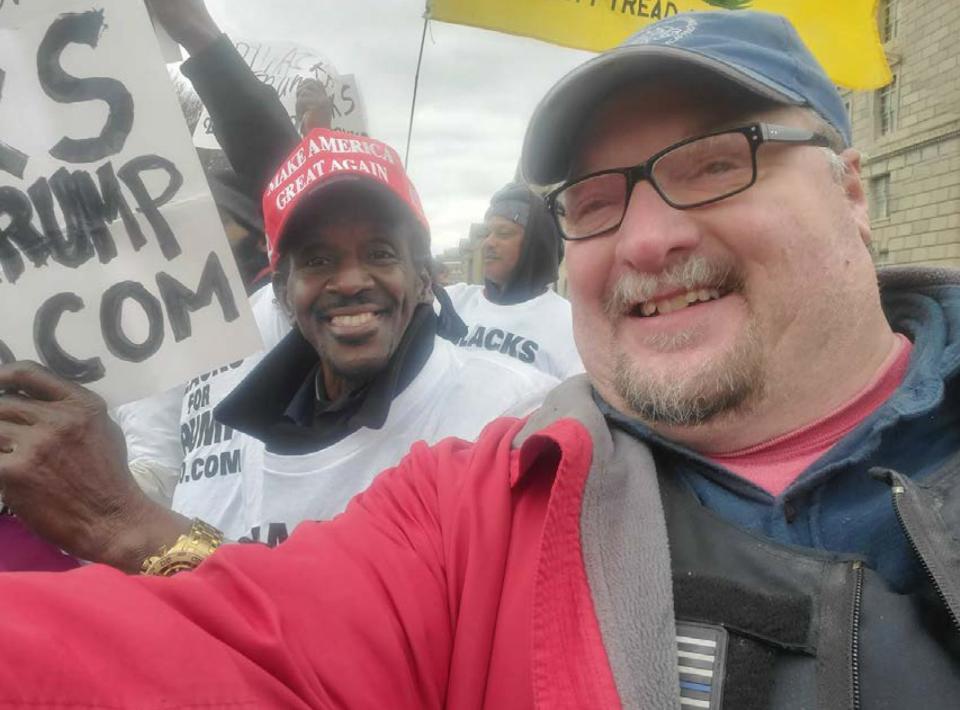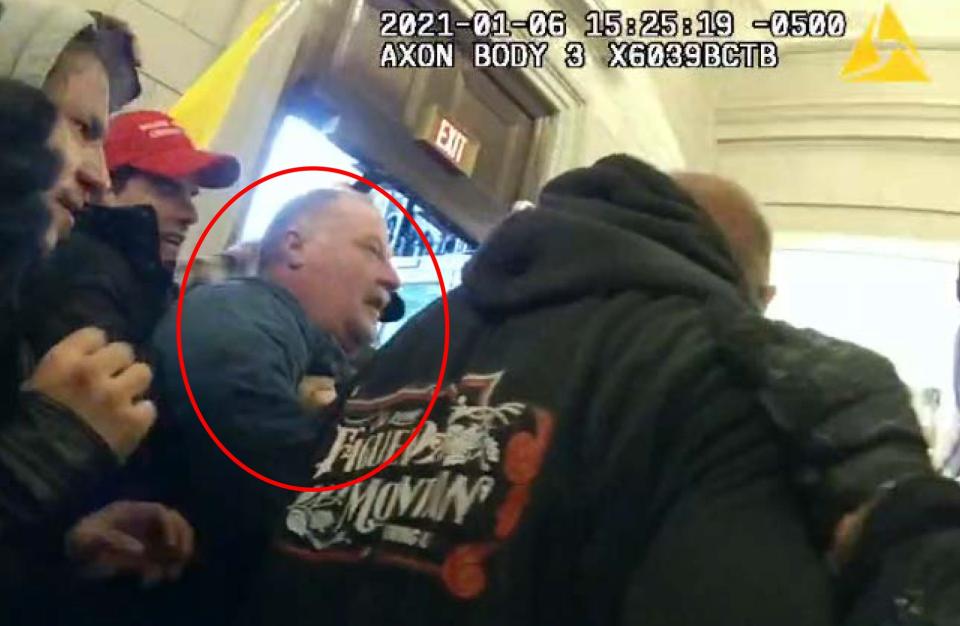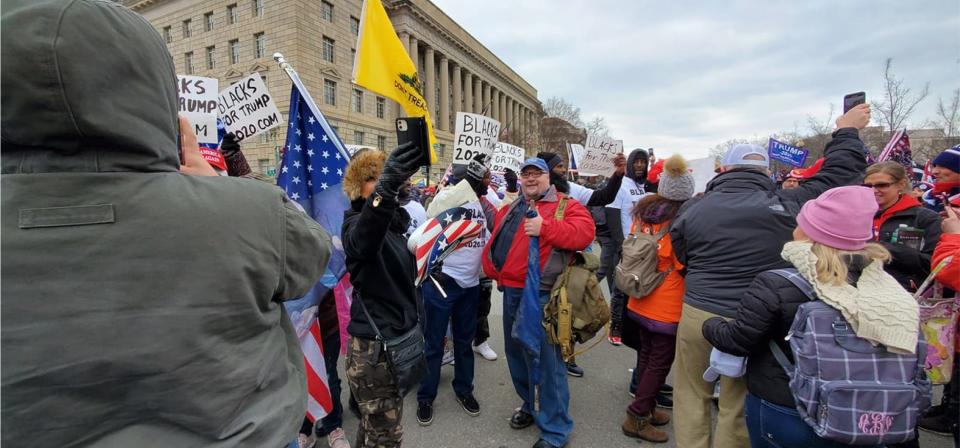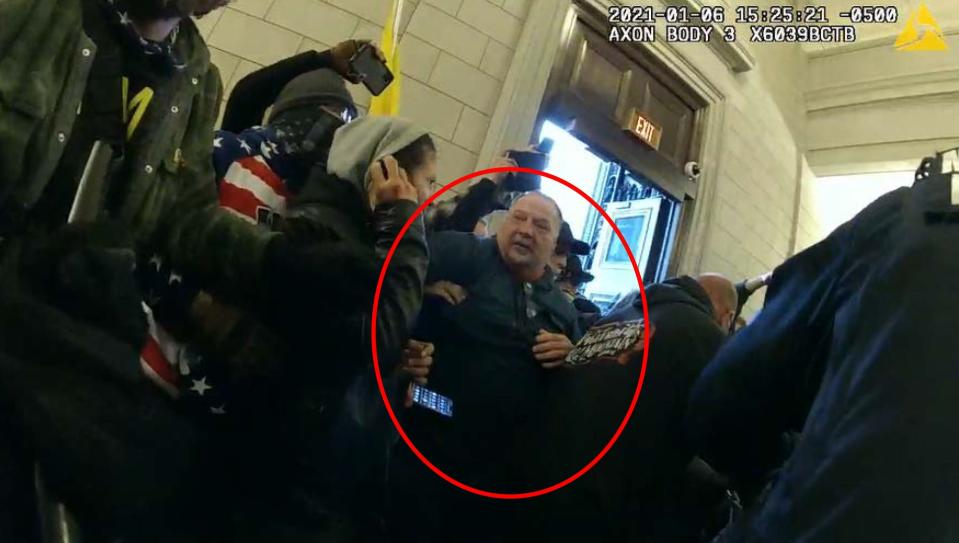A former cop yelled 'charge' on Jan. 6. How his Supreme Court case could help Trump.
WASHINGTON – Joseph Fischer was driving home to central Pennsylvania after attending then-President Donald Trump's "Stop the Steal" rally on Jan. 6, 2021, when he heard about the crowd swelling outside the Capitol and turned around.
Fischer, who was a police officer in North Cornwall Township, thought the day might turn violent. He had warned he might be jailed. Standing outside the East Rotunda doors at 3:24 p.m., Fischer turned on his phone's video recorder and yelled: "Charge!"
Fischer was among hundreds of people ? including Trump ? charged with obstruction for interrupting Congress as it certified President Joe Biden's victory.
Fischer is now asking the Supreme Court to overturn the obstruction charge, in an appeal that could affect one-fourth of the Jan. 6 defendants. The high court will hear arguments on April 16. The case could have big implications for Trump's election interference case.
The justices were asked to interpret an obstruction law Congress approved after the Enron scandal in 2002. Fischer contends that law aimed to punish the destruction of documents. But prosecutors called it a catchall that covers the obstruction of official meetings.

1 in 4 defendants from Jan. 6 riot were charged with obstructing Congress
The case could have a big impact on other Jan. 6 defendants. About 330 of the first 1,265 defendants in the attack were charged under the law, according to the Justice Department.
Another Jan. 6 defendant, Thomas Robertson, has challenged a different facet of the same law. Like Fischer, he lost an appeal. Robertson’s potential appeal to the Supreme Court is on hold while he waits for the justices to decide Fischer’s case.
But government lawyers led by Solicitor General Elizabeth Prelogar argued the obstruction law a "catchall” that should cover Fischer’s conduct “because he allegedly joined a violent riot with the purpose of disrupting a joint session of Congress convened to certify the election results."
Some Jan. 6 prisoners win early release while appealing cases for same charge as Fischer
Judges have already begun ordering the early release of Jan. 6 prisoners while they appeal the same charge as Fischer, rather than risk having them spend more time than warranted for misdemeanor convictions. The cases include:
? U.S. District Judge Amit Mehta in January ordered the immediate release of Thomas Adams Jr., who had entered the Senate chamber, after he served about five months of a 14-month sentence.
? U.S. District Judge Trevor McFadden last month ordered Kevin Seefried be released May 31, after a year in prison. Seefried was sentenced to three years behind bars as one of the first rioters to break into the Capitol and carried a Confederate battle flag he used to strike at a Black officer, McFadden wrote.
? U.S. District Judge John Bates in January ordered Alexander Sheppard to be released May 2, after six months behind bars. He was sentenced to 19 months after his conviction for “extremely serious conduct" for being among the first to enter the Capitol and overrun police.
Statute 'is valid' in Trump election interference case: DOJ special counsel Jack Smith
Two of the four charges in Trump’s election interference case rely on portions of the same law that Fischer is challenging. Trump’s trial is on hold while waiting for the Supreme Court to consider whether he is immune from all the federal charges, with arguments scheduled April 25.
Justice Department special counsel Jack Smith argued in a filing in Trump's immunity case that the obstruction charges "are valid."
While Fischer insisted that he hadn’t altered documents, Trump is charged with organizing fraudulent slates of presidential electors in 2020 and causing them to send fake certificates to Congress. Two lawyers and a political consultant helped implement the plan with Trump, which Smith contends was part of a conspiracy to steal the 2020 election.
“That alleged conduct falls well outside of any conception of presidential official acts,” Smith wrote.

What charges does Fischer face from Jan. 6?
The charges against Fischer include civil disorder, impeding police officers, entering and remaining in a restricted building, disorderly conduct and demonstrating in a Capitol building. The obstruction count disputed in the Supreme Court case is a felony carrying a maximum 20-year sentence.
“It might get violent,” Fischer wrote in a series of texts about his plans for the day, according to court records. He warned Police Chief John Leahy he might need him to “post bail.”
Instead, the chief accompanied the federal authorities who arrested Fischer in February 2021.
“Take democratic congress to the gallows,” Fischer wrote in texts, according to court records. “Can’t vote if they can’t breathe..lol.”
Running toward a line of police while yelling profanity
Fischer entered the Capitol wearing black-framed glasses and a navy blue sweater beneath a red jacket. Prosecutors charged him with running toward police officers while yelling profanity and crashing into the line before falling on the waxed Seneca sandstone floor. Fischer contends he was pushed toward police by the crowd and the swell knocked him to the ground. Police pepper-sprayed Fischer and forced him out of the building.
"We pushed police back about 25 feet, got pepper-balled ... but entry into the Capitol was needed to send a message that we the people hold the real power," Fischer wrote in a comment on Facebook.
Fischer contends he entered the Capitol after Congress had recessed, wasn't violent and spent less than four minutes inside.
The township's Board of Supervisors suspended Fischer without pay on the day of his arrest in February 2021 and fired him in June 2021. The board suspended Leahy with pay after Fischer's arrest and accepted his resignation in March 2021.
How did Fischer's case get to the Supreme Court?
The disputed law targets anyone who “corruptly” destroys or conceals a government record, or who “otherwise obstructs, influences, or impedes any official proceeding, or attempts to do so.”
U.S. District Judge Carl Nichols dismissed the obstruction count by ruling Fischer hadn’t destroyed documents.
A divided D.C. Circuit Court of Appeals panel voted 2-1 to overturn the decision and send it back to Nichols by ruling the law applied “to all forms of corrupt obstruction of an official proceeding.” Appeals Judge Justin Walker said the law would have had "breathtaking" scope if not for the requirement that a defendant acted "corruptly."
Fisher appealed that ruling to the Supreme Court.

Document shredding versus interrupting an official meeting
Congress approved the law in 2002 as part of an overhaul of the financial system. The provision aimed to punish the destruction of documents in the scandal surrounding Enron, after auditor Arthur Andersen LLP “had systematically destroyed potentially incriminating documents,” according to court records.
During the legislative debate, then-Sen. Joe Biden, D-Del., said the provision “strengthens an existing federal offense that is often used to prosecute document shredding and other forms of obstruction of justice.”
Fischer’s lawyers contend no defendant had been convicted of obstructing Congress before Jan. 6 outside of a legislative inquiry or investigation. “Put bluntly,” the lawyers argued, the rest of the law's history dating to 1831 revealed it was always used for damaging documents.
But government lawyers argued Congress enacted the disputed provision in 2002 to close a loophole exposed in the Enron scandal, which was a lack of prohibition against personally destroying documents.
Congress expanded what the law covered because of “the risk that corrupt obstruction could occur in unanticipated ways not prohibited by laws targeted at specific forms of obstruction,” Prelogar wrote.

Current and former GOP lawmakers debate need for statute
Sen. Tom Cotton, R-Ark., led a group of two other senators and 20 House members urging the Supreme Court to overturn the appeals panel by arguing the law's breadth allows for the prosecution of political rivals.
"It criminalizes political conduct and grants the Department of Justice nearly unfettered discretion to prosecute Americans based on the perceived morality of their political beliefs," the lawmakers wrote.
But former GOP Sen. John Danforth of Missouri led a group of two dozen former lawmakers, governors, judges and administration officials urging the justices not to overturn or rewrite the law.
"If America ever allowed the powerful impulse of might makes right to prevail over the peaceful transfer of power,'' the former officials wrote, ''we would have failed to keep our Republic.''
This article originally appeared on USA TODAY: How Trump could get help from an ex cop's Jan. 6 Supreme Court case
